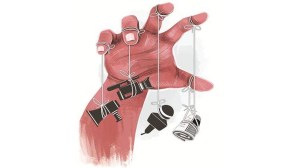A basic conflict
The Islamic world is faced with a situation that has set almost all the Muslim populations around the globe astir. This phenomenon is ground...

The Islamic world is faced with a situation that has set almost all the Muslim populations around the globe astir. This phenomenon is grounded in theological interpretations and the philosophy of jihad. It also reflects deeply felt sentiments of deprivation and antipathy in the Muslim world.
The jihadi doctrine has produced a pool of committed cadres in Muslim countries. An overwhelming majority of Muslims does not subscribe to the jihadi way of life but a substantial part of the Muslim population seems sympathetic to its political underpinnings.
The Al-Qaeda has burst into worldwide prominence after 9/11. But what is yet to be fully understood is that the Al-Qaeda is the manifestation of a condition. Osama bin Laden remains its symbolic face, but the phenomenon is larger. The vital elements of this phenomenon are injustices born out of the perpetual conflicts in the Islamic world. The Muslim mind today is also captive of the jihadi worldview that is incompatible with the emerging world order.
There is greater talk of political reforms in the Muslim world these days. The situation is compared with Japan and Germany of 1945; the progress made by these countries in embracing the liberal democratic way of life is cited. Can this analogy be applied to the Middle East?
Picture this. The Palestinian conflict is resolved, sovereignty is restored to the Iraqi people, America withdraws from Arab lands, bin Laden is captured or killed and the proposed reform process gets underway. Does that mean the end of conflict in the Arab world?
Unfortunately, the answer is not clear. The turmoil today is multifaceted. It can be safely concluded that the proposed reforms package would sharpen the conflict between the jihadi world view and the core values of liberal democracy which are individual freedom, economic and material development. The jihadi way of life believes in 8216;piety8217; and the denial of self and worldly comforts.
The basic conflict between the two worldviews is that one believes in life here and now and the other in life hereafter. There might be periods of greater turmoil followed by periods of relative calm, but the idea of a perfect and even a working peace between these different worldviews seems to be a difficult proposition in the near future.
The writer is president, Kashmir Foundation for Peace and Developmental studies, Srinagar
- 01
- 02
- 03
- 04
- 05































